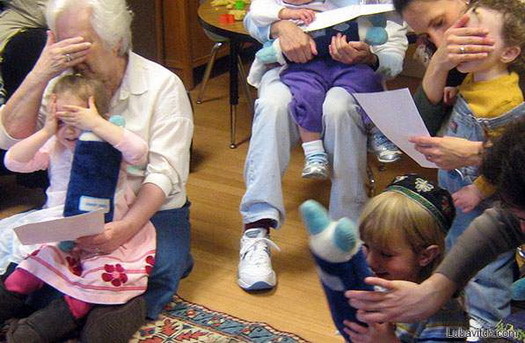
Judaism Grows in Gluten-Free, Religion-Free Oregon
Portland, Oregon, city of subcultures without a cause, now famous for a popular TV series mocking, as one reviewer wrote, its “supposed air of aimless, bohemian self-involvement, [and] the empty passions that dominate its world” is seeing a flowering of traditional Jewish life.
It is surprising that this city, which claims the smallest percentage of religiously affiliated citizens in the U.S., counts some 11 Chabad centers. Most of them have opened in recent years, a response to the state’s growing Jewish population wanting to affiliate.
The shift seems to reflect a pattern in the larger Pacific Northwest region, where the overall population has grown, and with it a Jewish population that has increased by 400 percent since the first Chabad representatives opened in Oregon 32 years ago.
Vicki Stone has been involved with Chabad of Oregon since their beginnings. As a young mother, she enrolled her son in the then new Chabad preschool, started by Rabbi Moshe and Devorah Wilhelm. Stone remembers the experience as “heimish,” a draw for the Chicago-born mother who was looking for a warm community.
Raised in a traditional Jewish household, Stone “moved” somewhat from her upbringing. But by the time her three children were born, she realized that unless she reconnects, they would, in all likelihood, veer off path further still, and become altogether disconnected from their faith.
Vicki enrolled her children in the Chabad preschool, which, in retrospect, she says, served as the catalyst not only for the children’s journey, but for her own.
The relationship she and her husband formed with the Wilhelms inspired them to become engaged, and in due course, they began to observe Shabbat and kosher, a lifestyle that has continued long after the children left home.
Stone may be atypical of her fellow Oregonians who are ultra liberal, gluten free and religion free. According to a report on 101KXL news radio, Portland claims the smallest percentage of religiously affiliated citizens. In fact, in February 2015, Councilwoman Trish Seiler came out against an “In God We Trust” display planned for inside a county building, saying she upheld secular values.
Still, says Stone, she’s witness to the explosive growth of Jewish Oregon. If 30 years ago, the infrastructure could be described as “very, very small,” today, she says, it is blossoming, with everything a Jewish family could hope for. Now home to many Jewish organizations, Oregon’s Jewish development is the result, she insists, of the seeds planted by the “Wilhelms, their partners, and people like us, the pioneers.”
Rabbi Chayim Shmaya Wilhelm grew up in Portland and now leads the Jewish community in the city’s southeastern area. When his parents moved to Oregon in 1984, there were about 8,000 Jews in the state. Today, the number is about 40,000—roughly one percent of Oregon’s total population, which itself has grown by almost one million over the last three decades.
The Wilhelms kept apace, establishing a Jewish day school, a mikveh, and a kosher supermarket, and re-cruiting eight more Chabad couples—among them the Wilhelm children, who, like Shmaya, serve 11 different Jewish communities in the state.
In Hillsboro, known as Oregon’s Silicon Forest for the high tech companies that operate there, Chabad is the only existing Jewish organization. As companies like Intel, Yahoo! Oracle’s High End Operations, Synopsys, Epson a Genetech plant, and biotech and medical companies opened there, Hillsboro’s population grew by 30.5 percent, making it, according to a January 2010 report in Bloomberg Businessweek, one of the fastest-growing cities in Oregon for the period between 1990 and 2010. Since arriving to Hillsboro in 2007, Rabbi Menachem and Chaya Rivkin have developed educational and social programs that appeal to the city’s Jews where the median age is around 32, many of whom work at Intel.
Adopted by Chabad
Alta Franco, became involved with Chabad after the birth of her first child two years ago.
“I walked into the only Jewish store in Portland I could find and was invited for Shabbat dinner,” Franco recalls. “I sought out a community and got adopted by Chabad that night.”
Franco, whose children go to the Chabad preschool and mommy-and-me classes at the Chabad center, says she wasn’t sure where she fit on the Jewish spectrum because she doesn’t really identify with any one Jewish philosophy. Chabad works for her.
“They incorporate and have a space for everyone,” she says. “They’ve created an environment of a lot of learning and diversity. We have been very happy.”
Franco’s story is repeated by others. Rabbi Motti Wilhlem, another of the Wilhelms’ children now leading the Jewish community with his wife Mimi in Portland’s Westside, talks about a young woman who defied her Jewish parents by intermarrying and escaping to Portland, refusing to engage with Chabad or any other organized Jewish option. She signed up for a mommy-and-me group, not knowing it was at Chabad. Now, she sends her child to Chabad preschool.
“She’s told her parents that she wants to create her own journey,” says Motti. “Now she is on a Jewish journey.”
Sara Rosenberg Brown is a young mother in southeast Portland. Raised Reform and intermarried, she wasn’t sure she could find her place in the Jewish community. But she knew she wanted to raise Jewish kids.
“I have been involved in Judaism my entire life and I have never felt so welcome. They don’t make me feel less because I don’t keep Shabbat,” says Brown, “and they don’t ignore me just because I am a woman.”
Brown’s son in enrolled in the Jewish preschool and her family regularly attends Chabad events. Her husband is learning, too. She says growing up Reform she felt Judaism revolved around the synagogue, and that the congregation, though deemed liberal, was not open to alternate ideas or even constituents who were interested in exploring their Judaism on a deeper level. Today, she feels her son is getting more from Chabad than she ever had.
“I think that now Judaism is part of our life, our household. My son very much identifies as Jewish and I see it is becoming ingrained in who he is, in every aspect of his life,” says Brown. “I appreciate that so much.”















Me
What an attitude this writer has! What’s wrong with gluten-free? Many people in NY are gluten-free! People from Oregon are open-minded and not stuck with NY attitude. Good grief.
Esther
As someone who grew up in Oregon, I can say that the growth of Yiddishkeit there is an almost unimaginable testament to the pure ahavas yisroel of its shluchim.
TorahYid
Gluten is 100% natural and very, very healthy. If you eliminate gluten from your diet without truly being allergic to celiac (aka your insides become your outsides when you eat the smallest portion) then you are cutting out a major nutritional source.
Small town shluchim
Kol hakavod to Chabad of Oregon!
It’s disappointing that this article about Portland lumps all Oregon Chabad houses together under Chabad of Portland. Each of the small-town shluchim work very hard to create their own identity in their shtetlach and it is likely frustrating to constantly be counted as a Portland mosed, even though they are hours away. Portland has 3 Chabad houses and a school, with 6 families of Shluchim ka”h. The remaining 5 Shluchim are spread out over the state. It is only right to give them their due attention.